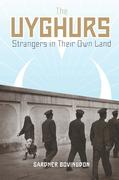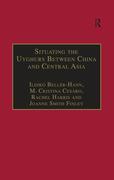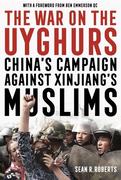Did you mean:
Uyghur32 Results for : uyghurs
-

Karakorum: The History and Legacy of the Mongol Empire's Capital , Hörbuch, Digital, ungekürzt, 65min
About 225 miles west of Ulaanbaatar, the present-day capital city of Mongolia, are the ruins of Karakorum, the ancient capital of the Mongol Empire. Located in the Orkhon River Valley, at the foot of the Khangai Mountain range, the city was founded by Genghis Khan in 1220 CE. Under his son and successor, Ögedei Khan, Karakorum grew into a thriving city, with high walls enclosing an urban landscape of brick-built structures and paved roads, divided into different districts with a palace, craft workshops, and marketplaces. Under Ögedei and his successors, Karakorum became a cosmopolitan hub of crafts and exchange along the great Silk Road trading network. Genghis Khan followed the tradition of his nomadic predecessors when he founded Karakorum in the Orkhon Valley. The landscape had previously been settled by many different nomads and empires, including the Huns, Turks, and Uyghurs. These different cultures - despite existing over vastly different periods of time - found common ground in the Orkhon Valley. There they demarcated sites of significance with structures that have survived to the present day, a rarity in the archaeology of nomadic peoples. Archaeological material dating to the Paleolithic period through the Bronze and Iron Ages has been found in the Orkhon Valley, and later monuments include the memorial sites of the Turks, who maintained an extensive funerary area around the Bilge Khagan and Kul Tigin memorials in the sixth and seventh centuries CE, and the Uyghur capital city of Ordu-Baliq from the eighth and ninth centuries. Each of these people left their mark on the landscape, and in the mythologies of the ancient conquerors of the Eurasian steppe, so it is no wonder that the far-flung Mongol Empire considered Karakorum in the Orkhon Valley to be their capital. The story of Karakorum did not end with the decline of the Mongol Empire either. From the 16th century onwards the area became the center of Mongolian Buddhism, a fact underscor ungekürzt. Language: English. Narrator: Scott Clem. Audio sample: https://samples.audible.de/bk/acx0/087146/bk_acx0_087146_sample.mp3. Digital audiobook in aax.- Shop: Audible
- Price: 9.95 EUR excl. shipping
-

No Escape: The True Story of China's Genocide of the Uyghurs
No description.- Shop: buecher
- Price: 44.45 EUR excl. shipping
-

No Escape: The True Story of China's Genocide of the Uyghurs
No description.- Shop: buecher
- Price: 25.99 EUR excl. shipping
-

The Traveling Minzu (eBook, PDF)
Based on Uyghur business migrants' everyday experiences, this book investigates how individuals embody and deploy minzu, one of the fundamental concepts in Chinese political and socio-economic discourses after 1949 in China and how this concept travels to Australia with the migrants. By exploring Uyghurs at the Tarim restaurant in Ürümchi, Uyghur migrants in other major cities in China, and finally the immigrants in multicultural Australia, the author explains how they perceive the concept of minzu and how such concept and an identity has been reformed and reshaped in specific social and economic contexts. She argues that these Uyghur migrants' minzu concept has closely intertwined with citizenship, which not only entails a set of legally defined rights and obligations but also the sense of equality and respect. The book provides a new way of reflecting on who are the "Chinese" and what form the "Chineseness" in a transnational context. Following the minzu concept in China and Australia, this book shows how cultural intimacy and critical multiculturalism can provide better socio-cultural space for various Muslim migrant communities. This book will be appealing to social and cultural anthropologists and university students who are interested in China and Inner Asia, ethnicity and transnational migration between China and the South Pacific.- Shop: buecher
- Price: 31.95 EUR excl. shipping
-

The Traveling Minzu (eBook, ePUB)
Based on Uyghur business migrants' everyday experiences, this book investigates how individuals embody and deploy minzu, one of the fundamental concepts in Chinese political and socio-economic discourses after 1949 in China and how this concept travels to Australia with the migrants. By exploring Uyghurs at the Tarim restaurant in Ürümchi, Uyghur migrants in other major cities in China, and finally the immigrants in multicultural Australia, the author explains how they perceive the concept of minzu and how such concept and an identity has been reformed and reshaped in specific social and economic contexts. She argues that these Uyghur migrants' minzu concept has closely intertwined with citizenship, which not only entails a set of legally defined rights and obligations but also the sense of equality and respect. The book provides a new way of reflecting on who are the "Chinese" and what form the "Chineseness" in a transnational context. Following the minzu concept in China and Australia, this book shows how cultural intimacy and critical multiculturalism can provide better socio-cultural space for various Muslim migrant communities. This book will be appealing to social and cultural anthropologists and university students who are interested in China and Inner Asia, ethnicity and transnational migration between China and the South Pacific.- Shop: buecher
- Price: 31.95 EUR excl. shipping
-

The Contest of the Fruits
A satirical poem about the rivalry of various fruits becomes a point of departure for investigations of tolerance and identity in a pluralistic world. The Contest of the Fruits takes a nineteenth-century Uyghur satirical poem as a departure point for investigations of language, politics, religion, humor, resilience, and resistance in a pluralistic world. Composed at the crossroads of multiple civilizations and empires and born of the Uyghurs' liminal position at the edges of Islam and the frontiers of China, "The Contest of the Fruits" captures a world in which borders are gateways rather than dividing lines. The poem, highly performative, embellished with verbal flourishes, and featuring the ribald rivalry of such fruits as mulberry, pomegranate, quince, and pear, may be the first Turkic rap battle. The book, which accompanies a project by the art collective Slavs and Tatars, brings together artists, academics, poets, and performers to create a visually compelling volume that deploys different registers (high and low) to examine subjects often considered mutually exclusive (for example, religion and hip-hop). It offers essays by leading scholars and journalists that cover topics ranging from language politics to the prominence of Uyghur rappers in China. Shorter "pop-out" texts take a more tentacular approach to Uyghur culture, sampling poetry by diaspora Uyghur poets and discussing such subjects as calligraphy, Uyghur pop music, mäshräp, and the Sufi practice of Samac. Copublished with Haverford College- Shop: buecher
- Price: 20.99 EUR excl. shipping
-

The Great Dispossession
The Great Dispossession - Uyghurs between Civilizations: ab 39.9 €- Shop: ebook.de
- Price: 39.90 EUR excl. shipping
-

The Uyghurs
The Uyghurs - Strangers in Their Own Land: ab 23.49 €- Shop: ebook.de
- Price: 23.49 EUR excl. shipping
-

Situating the Uyghurs Between China and Central Asia
Situating the Uyghurs Between China and Central Asia: ab 48.99 €- Shop: ebook.de
- Price: 48.99 EUR excl. shipping
-

The War on the Uyghurs
The War on the Uyghurs - China's campaign against Xinjiang's Muslims: ab 27.99 €- Shop: ebook.de
- Price: 27.99 EUR excl. shipping